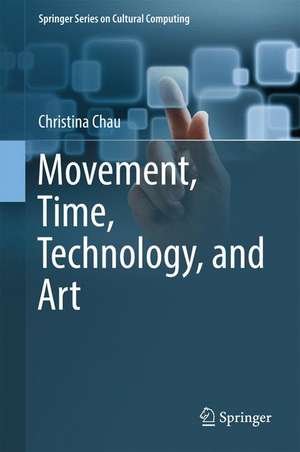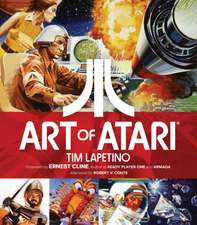Movement, Time, Technology, and Art: Springer Series on Cultural Computing
Autor Christina Chauen Limba Engleză Hardback – 26 iun 2017
This book explores the ways in which artists use technology to create different perceptions of time in art in order to reflect on contemporary relationships to technology. By considering the links between technology, movement and contemporary art, the book explores changing relationship between temporality in art, art history, media art theory, modernity, contemporary art, and digital art.
This book challenges the dominant view that kinetic art is an antiquated artistic experiment and considers the changing perception of kinetic art by focusing on exhibitions and institutions that have recently challenged the notion of kinetic art as a marginalised and forgotten artistic experiment with mechanical media. This is achieved by deconstructing Frank Popper’s argument that kinetic art is a precursor to subsequent explorations in the intersections between art, science and technology.
Rather than pandering to the prevailing art historicalassumption that kinetic sculpture is merely a precursor to art in a digital culture, the book proposes that perhaps kineticism succeeded too well, where movement has become a ubiquitous element of the aesthetic of contemporary art. If, as Boris Groys has recently suggested, installation has become the dominant mode of art in the contemporary age, then movement in real time with the viewer is used to aestheticise and explore the facets of our peculiar time.
| Toate formatele și edițiile | Preț | Express |
|---|---|---|
| Paperback (1) | 577.07 lei 43-57 zile | |
| Springer Nature Singapore – 12 dec 2018 | 577.07 lei 43-57 zile | |
| Hardback (1) | 639.73 lei 43-57 zile | |
| Springer Nature Singapore – 26 iun 2017 | 639.73 lei 43-57 zile |
Din seria Springer Series on Cultural Computing
- 20%
 Preț: 648.26 lei
Preț: 648.26 lei - 20%
 Preț: 657.02 lei
Preț: 657.02 lei - 20%
 Preț: 167.45 lei
Preț: 167.45 lei - 20%
 Preț: 259.93 lei
Preț: 259.93 lei - 20%
 Preț: 332.89 lei
Preț: 332.89 lei - 20%
 Preț: 989.96 lei
Preț: 989.96 lei - 20%
 Preț: 660.48 lei
Preț: 660.48 lei - 20%
 Preț: 1308.39 lei
Preț: 1308.39 lei - 20%
 Preț: 936.37 lei
Preț: 936.37 lei - 20%
 Preț: 1164.84 lei
Preț: 1164.84 lei - 20%
 Preț: 334.20 lei
Preț: 334.20 lei - 20%
 Preț: 1165.69 lei
Preț: 1165.69 lei - 20%
 Preț: 937.43 lei
Preț: 937.43 lei - 20%
 Preț: 1046.24 lei
Preț: 1046.24 lei - 20%
 Preț: 1056.78 lei
Preț: 1056.78 lei - 20%
 Preț: 322.50 lei
Preț: 322.50 lei - 20%
 Preț: 940.47 lei
Preț: 940.47 lei - 20%
 Preț: 341.95 lei
Preț: 341.95 lei - 20%
 Preț: 1051.32 lei
Preț: 1051.32 lei - 20%
 Preț: 844.13 lei
Preț: 844.13 lei - 20%
 Preț: 1284.98 lei
Preț: 1284.98 lei - 20%
 Preț: 660.51 lei
Preț: 660.51 lei - 20%
 Preț: 897.79 lei
Preț: 897.79 lei - 20%
 Preț: 367.28 lei
Preț: 367.28 lei - 20%
 Preț: 1159.10 lei
Preț: 1159.10 lei - 20%
 Preț: 645.97 lei
Preț: 645.97 lei - 20%
 Preț: 338.16 lei
Preț: 338.16 lei - 20%
 Preț: 655.02 lei
Preț: 655.02 lei - 20%
 Preț: 648.95 lei
Preț: 648.95 lei - 20%
 Preț: 710.49 lei
Preț: 710.49 lei - 20%
 Preț: 1050.86 lei
Preț: 1050.86 lei - 20%
 Preț: 1164.05 lei
Preț: 1164.05 lei - 20%
 Preț: 1052.77 lei
Preț: 1052.77 lei - 20%
 Preț: 652.07 lei
Preț: 652.07 lei
Preț: 639.73 lei
Preț vechi: 752.63 lei
-15% Nou
Puncte Express: 960
Preț estimativ în valută:
122.41€ • 128.13$ • 101.89£
122.41€ • 128.13$ • 101.89£
Carte tipărită la comandă
Livrare economică 31 martie-14 aprilie
Preluare comenzi: 021 569.72.76
Specificații
ISBN-13: 9789811047046
ISBN-10: 9811047049
Pagini: 150
Ilustrații: VI, 148 p.
Dimensiuni: 155 x 235 mm
Greutate: 0.4 kg
Ediția:1st ed. 2017
Editura: Springer Nature Singapore
Colecția Springer
Seria Springer Series on Cultural Computing
Locul publicării:Singapore, Singapore
ISBN-10: 9811047049
Pagini: 150
Ilustrații: VI, 148 p.
Dimensiuni: 155 x 235 mm
Greutate: 0.4 kg
Ediția:1st ed. 2017
Editura: Springer Nature Singapore
Colecția Springer
Seria Springer Series on Cultural Computing
Locul publicării:Singapore, Singapore
Cuprins
Introduction.- Revolutions.- Directions in Kinetic Art.- Systems Aesthetics.- Digital Determinism.- Three Key Influences of the Kinetic Aesthetics.- Your Negotiable Panorama.- Our Consciousness of Time.
Notă biografică
Christina Chau is a lecturer in Media, Culture and Creative Arts at Curtin University, and editorial assistant for the academic journal Deleuze Studies.
Textul de pe ultima copertă
This book explores the ways in which artists use technology to create different perceptions of time in art in order to reflect on contemporary relationships to technology. By considering the links between technology, movement and contemporary art, the book explores changing relationship between temporality in art, art history, media art theory, modernity, contemporary art, and digital art.
This book challenges the dominant view that kinetic art is an antiquated artistic experiment and considers the changing perception of kinetic art by focusing on exhibitions and institutions that have recently challenged the notion of kinetic art as a marginalised and forgotten artistic experiment with mechanical media. This is achieved by deconstructing Frank Popper’s argument that kinetic art is a precursor to subsequent explorations in the intersections between art, science and technology.
Rather than pandering to the prevailing art historical assumption that kinetic sculpture is merely a precursor to art in a digital culture, the book proposes that perhaps kineticism succeeded too well, where movement has become a ubiquitous element of the aesthetic of contemporary art. If, as Boris Groys has recently suggested, installation has become the dominant mode of art in the contemporary age, then movement in real time with the viewer is used to aestheticise and explore the facets of our peculiar time.
Caracteristici
Provides a contemporary analysis of the intersections between time technology and art Embarks on a new deconstruction of the history of kinetic art, which is often thought of as a precursor to computer and digital art Includes a chapter on immersive and participatory installations by contemporary artist Olafur Eliasson Includes supplementary material: sn.pub/extras Includes supplementary material: sn.pub/extras







